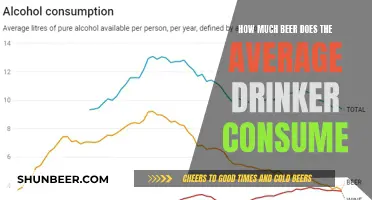
Drinking beer every day may cause high blood pressure. Alcohol consumption is a preventable cause of hypertension, or high blood pressure, in both men and women. Drinking a lot of alcohol over a long period can damage the heart or interfere with its function, and it can also affect the muscles in your blood vessels, causing them to become narrower. This means the heart has to work harder to pump blood around the body, increasing blood pressure. While some studies have shown that light-moderate drinking can lead to a subtle drop in blood pressure, drinking more than one or two drinks in a sitting has been directly linked to a rapid rise in blood pressure.
| Characteristics | Values |
|---|---|
| Alcohol consumption and high blood pressure | Drinking alcohol can increase blood pressure, and repeated drinking can cause sustained high blood pressure. |
| Alcohol's effect on blood vessels | Alcohol can cause blood vessels to become narrower, which makes the heart work harder to pump blood around the body, increasing blood pressure. |
| Recommended alcohol intake | The American Heart Association recommends no more than two drinks per day for men and no more than one drink per day for women. |
| Alcohol and heart health | Alcohol can damage the heart or interfere with its function, increasing the risk of cardiovascular disease, heart attack, and stroke. |
| Preventing high blood pressure | Limiting alcohol intake, losing weight, exercising, and reducing salt intake can help prevent high blood pressure. |
What You'll Learn

Alcohol consumption and blood vessel constriction
Alcohol consumption has a complex effect on the cardiovascular system. It is well known that there is a relationship between alcohol and hypertension, and a reduction in alcohol intake is widely recommended in the management of hypertension. Alcohol has both pressor and depressor actions. The depressor actions are more apparent in people of East Asian descent, especially those who experience alcohol flush due to a genetic variation in aldehyde dehydrogenase activity.
Repeated alcohol consumption in the evening causes an elevation in daytime blood pressure and a reduction in nighttime blood pressure, with little change in the average 24-hour blood pressure in Japanese men. Thus, the hypertensive effect of alcohol seems to be overestimated by the measurement of casual blood pressure during the day.
Heavy alcohol intake seems to increase the risk of several cardiovascular diseases, such as hemorrhagic stroke, arrhythmia, and heart failure. On the other hand, alcohol may act to prevent atherosclerosis and decrease the risk of ischemic heart disease, mainly by increasing HDL cholesterol and inhibiting thrombus formation.
A J- or U-shaped relationship has been observed between the level of alcohol intake and the risk of cardiovascular and total mortality. It is reasonable to reduce alcohol intake to less than 30 ml per day for men and 15 ml per day for women in the management of hypertension. As a small amount of alcohol seems to be beneficial, abstinence from alcohol is not recommended to prevent cardiovascular disease.
Beer Overdose: UTI Risk and Prevention
You may want to see also

Alcohol intake and heart health
Drinking beer every day can cause high blood pressure, which is a major risk factor for cardiovascular disease. High blood pressure, or hypertension, means that your heart has to pump harder, and the arteries have to carry blood that's flowing under greater pressure. This puts a strain on your arteries and your heart, increasing your risk of a heart attack, stroke, or kidney disease.
Alcohol can damage the heart or interfere with its function, especially if you've been drinking heavily over a long period of time or consuming too much on a single occasion. This can lead to various problems, including high blood pressure, an increased risk of strokes, cardiomyopathy (stretching and drooping of the heart muscle), and arrhythmias (irregular heartbeat).
The more alcohol you drink, the higher the risk of developing hypertension. If you drink regularly, you are at risk, especially if you're over 35. Even one drink a day can increase the risk. When your blood vessels are narrower, the heart has to work harder to push blood around your body, causing your blood pressure to rise.
Binge drinking and long-term heavy drinking can lead to strokes. Alcohol also causes other problems that can lead to strokes or make them worse, such as a weakened heart muscle, cardiomyopathy, and arrhythmias.
While some research suggests that light-to-moderate drinking may have a subtle positive effect on blood pressure, especially in adults over 50, it is not significant enough to recommend drinking as a broad rule. The benefits or risks of drinking depend on a person's entire health profile, including their lifestyle and genetic risk factors.
To maintain good heart health, it is essential to make lifestyle changes such as reducing salt and sodium intake, achieving optimal weight, exercising regularly, and managing stress. If you are concerned about your alcohol intake or high blood pressure, it is important to consult with your healthcare provider for personalized advice and support.
A Day at the Beer Hall: A Beginner's Guide
You may want to see also

Recommended alcohol intake
Excessive alcohol consumption can increase the risk of high blood pressure. Drinking too much alcohol can raise your blood pressure, and if you already have high blood pressure, a healthcare professional may advise you to cut back on drinking.
According to the American Heart Association, it is best to limit alcohol consumption to no more than two drinks per day for men and one drink per day for women. Generally, one drink equals:
- 12-ounce beer (5% alcohol)
- 8-ounce malt liquor (7% alcohol)
- 5-ounce glass of wine (12% alcohol)
- 1.5 ounces of 80-proof liquor
It is important to note that red wine, despite being associated with improved heart health, is not a miracle drink. While small amounts of red wine may have heart health benefits, these effects may be influenced by lifestyle factors other than alcohol. As with any dietary or lifestyle choice, moderation is key.
Recent research suggests that even moderate drinking may pose risks to heart health. Alcohol can interfere with the effectiveness of medications, and its impact on blood pressure likely depends on the amount consumed and the time elapsed since consumption. Therefore, it is recommended to consult a doctor to determine a safe level of alcohol consumption, especially for those with high blood pressure.
Shingles and Beer: A Safe Mix?
You may want to see also

Alcohol and calcium levels
Alcohol consumption can have a significant impact on calcium levels in the body, which in turn can affect blood pressure and bone health.
Calcium is essential for maintaining strong bones, as well as for muscle and nerve functioning. While calcium levels in the blood typically remain stable, alcohol intake can disrupt the absorption and storage of calcium in the bones. Heavy and chronic alcohol consumption can affect calcium levels in several ways. Firstly, it interferes with the pancreas and its absorption of calcium and vitamin D. Alcohol also affects the liver, which is crucial for activating vitamin D, a vital component for calcium absorption. Additionally, many individuals who consume excessive amounts of alcohol struggle to absorb fat efficiently, yet fat is necessary for the absorption of calcium and vitamin D.
The combination of poor nutrition and alcohol's impact on calcium absorption can lead to deficiencies over time. Alcohol-induced bone deficiencies may be reversible if an individual stops drinking. However, during the period of excessive alcohol consumption, the body's calcium levels decrease, leading to an increase in parathyroid levels. This, in turn, inhibits the production of osteoblasts, which are the cells responsible for bone formation.
Furthermore, alcohol consumption increases the amount of calcium that binds to blood vessels, making them more sensitive to compounds that cause constriction. This constriction of blood vessels leads to an increase in blood pressure.
Excessive alcohol consumption is a significant health risk, and its impact on calcium levels and bone health is a contributing factor. To maintain optimal bone health and prevent conditions like osteoporosis, it is essential to limit alcohol intake and ensure adequate calcium and vitamin D intake.
Drinking Beer at Sheetz: What You Need to Know
You may want to see also

Alcohol's impact on kidney function
Alcohol can have a detrimental impact on kidney function. Drinking alcohol affects many parts of the body, including the kidneys, which are responsible for filtering harmful substances from the blood, such as alcohol itself.
The kidneys of heavy drinkers have to work harder, and their function can be altered by alcohol, making them less able to filter the blood effectively. Alcohol also affects the kidneys' ability to regulate fluid and electrolyte levels in the body. When alcohol dehydrates the body, the drying effect can impact the normal function of cells and organs, including the kidneys. In addition, alcohol can disrupt the hormonal control mechanisms that govern kidney function.
Chronic drinking can lead to liver disease, which adds to the burden on the kidneys. Liver disease impairs the kidneys' ability to maintain the correct rate of blood flow, which is crucial for effective blood filtration. Established liver disease, in conjunction with chronic alcohol consumption, can lead to severe alterations in the body's acid-base balance and potentially acute kidney failure.
Binge drinking, defined as consuming more than four to five drinks within two hours, can cause a sudden drop in kidney function, known as acute kidney injury. This often resolves with time, but it can sometimes lead to lasting kidney damage. Even without binge drinking, regular heavy drinking has been found to double the risk of chronic kidney disease.
To protect kidney health, it is important to limit alcohol intake. Experts recommend no more than one to two drinks per day for men and one drink per day for women and the elderly.
Drinking Beer Underwater: Is It Possible?
You may want to see also
Frequently asked questions
Drinking beer every day can cause high blood pressure. Alcohol consumption is an entirely preventable cause of hypertension in both men and women.
High blood pressure, or hypertension, is when the heart has to pump blood around the body with more force, increasing the pressure on arteries.
High blood pressure rarely causes obvious symptoms. Many people may not know they have it until they experience a serious acute event such as a heart attack or stroke.
High blood pressure increases the risk of heart problems, stroke, and kidney disease. It is one of the leading causes of cardiovascular disease.
To lower blood pressure, it is recommended to lose weight, eat a healthy diet, reduce salt intake, and reduce stress. It is also important to limit alcohol consumption.







